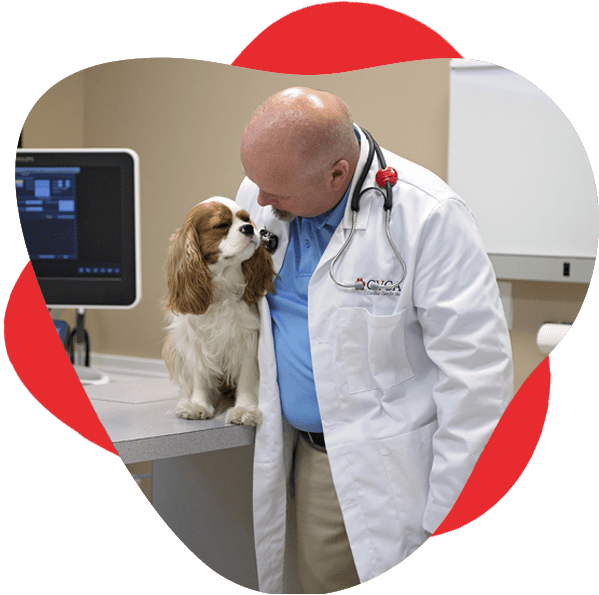Checking Out the Vital Providers Provided by a Veterinary Cardiologist: Comprehending Ultrasound and CT Check Methods
Vet cardiologists play an important duty in the health of animals by detecting and dealing with various heart conditions. They make use of advanced imaging methods, such as heart ultrasound and CT scans, to give exact examinations. Each method has its distinct advantages and applications. Recognizing these techniques is vital for pet proprietors looking for the most effective look after their friends. What elements should family pet owners take into consideration when picking between these diagnostic devices?

The Role of Veterinary Cardiologists in Pet Health Care
Veterinary cardiologists play an essential role in the health care of pets, concentrating specifically on diagnosing and treating heart-related problems. They have specialized training that allows them to analyze complicated diagnostic examinations and determine different cardiovascular problems. These professionals utilize advanced methods, such as echocardiography and electrocardiography, to evaluate heart function and structure accurately.Veterinary cardiologists also create customized treatment plans that may consist of medicines, lifestyle modifications, and, in some cases, medical interventions. Their know-how encompasses educating pet dog proprietors regarding heart health and wellness, highlighting the importance of regular check-ups and very early detection of prospective problems. Partnership with general veterinarians is crucial, as it assures extensive take care of family pets with thought cardiac issues. By providing specialized services, veterinary cardiologists considerably enhance the lifestyle for pets and supply assurance for their proprietors, reinforcing the relevance of heart health in total pet dog health.
Usual Cardiac Problems in Animals
Common heart issues in animals can greatly impact their wellness and lifestyle. Heart murmurs, different kinds of cardiomyopathy, and genetic heart issues are amongst the most common conditions that veterinarians encounter. CT Scans For Dogs. Recognizing these problems is important for animal owners to assure prompt diagnosis and ideal treatment
Heart Murmurs in Pets
Heart whisperings can be a source of worry for pet dog owners, they are not always indicative of severe wellness problems. A heart murmur is an abnormal sound generated by stormy blood circulation within the heart. In family pets, these murmurs can be caused by different factors, consisting of hereditary heart problems, valve issues, or even stress and anxiety during assessments. Numerous animals with heart murmurs lead typical lives without considerable health and wellness impacts. To establish the underlying cause, vet cardiologists typically utilize diagnostic methods such as echocardiograms and Doppler ultrasounds. Early detection and analysis are important, as they may aid handle any type of potential cardiac issues successfully. Animal proprietors are motivated to consult their veterinarian for a thorough analysis if a heart murmur is discovered.
Cardiomyopathy Kind Explained
Cardiomyopathy encompasses a group of illness affecting the heart muscle, resulting in jeopardized cardiac function in animals. One of the most usual kinds include dilated cardiomyopathy (DCM), hypertrophic cardiomyopathy (HCM), and restrictive cardiomyopathy (RCM) DCM mainly influences pets, causing the heart to enlarge and damage, which decreases its ability to pump blood successfully. In contrast, HCM is extra prevalent in pet cats, characterized by the thickening of the heart walls, frequently leading to blocked blood flow. RCM, though much less common, takes place when the heart muscle mass ends up being inflexible, restricting its capability to fill with blood. Each type offers distinct obstacles in diagnosis and treatment, demanding specialized vet cardiological assessment to guarantee peak administration and care for impacted animals.
Hereditary Heart Problems
Hereditary heart issues represent a considerable group of cardiac problems in animals, distinctive from obtained conditions such as cardiomyopathy - CT Scans For Animals. These problems are architectural abnormalities existing at birth, affecting the heart's regular function. Common kinds include patent ductus arteriosus, ventricular septal issues, and pulmonic stenosis. Signs may vary commonly, varying from mild to severe, and can include exercise intolerance, coughing, and difficulty breathing. Early medical diagnosis with advanced imaging strategies like ultrasound is vital for reliable monitoring. Vet cardiologists play an essential duty in identifying these conditions and suggesting appropriate therapy choices, which might consist of clinical monitoring or surgical intervention. Recognizing hereditary heart issues allows for far better end results and boosted lifestyle for affected pets
Comprehending Heart Ultrasound: Exactly How It Works
A considerable variety of veterinary practices currently utilize cardiac ultrasound as a vital diagnostic tool for examining heart health in pets. This non-invasive technique utilizes high-frequency acoustic waves to develop pictures of the heart's structure and feature. Throughout the treatment, a vet service technician applies a gel to the pet's upper body and utilizes a transducer to send out ultrasound waves. These waves bounce off the heart and surrounding structures, producing real-time images on a monitor.Veterinarians can analyze various elements of cardiac health, consisting of chamber dimension, wall surface my link movement, and shutoff feature. In addition, heart ultrasound allows for the discovery of abnormalities such as liquid build-up and congenital heart problems. This technique is vital for Get More Info detecting conditions that may not be visible through standard radiographs. By providing in-depth information about the heart's anatomy and efficiency, cardiac ultrasound help in creating reliable therapy prepare for animals suffering from cardiovascular disease.
The Significance of CT Checks in Detecting Heart Conditions
Just how do CT scans improve the diagnosis of heart disease in vet medicine? CT scans provide thorough cross-sectional pictures of the heart and surrounding frameworks, enabling veterinarians to envision intricate anatomical partnerships. This imaging technique is especially beneficial in identifying genetic heart problems, heart growths, and abnormalities in capillary. By making use of sophisticated imaging algorithms, CT scans can examine heart chamber sizes and feature, offering a detailed sight that may be tough to achieve with standard methods.Additionally, CT angiography can visualize blood circulation and identify areas of constriction or obstruction, which is important for preparing possible treatments. The speed and precision of CT scans additionally assist in quick diagnoses, essential in emergency situation scenarios. Inevitably, the unification of CT scans into veterinary cardiology significantly improves the accuracy of medical diagnoses, allowing targeted treatment strategies and enhancing individual outcomes for animals experiencing heart conditions.
Contrasting Ultrasound and CT Scan Methods
While both ultrasound and CT scans are very useful devices in vet cardiology, they provide unique advantages and constraints that influence their usage in diagnosing heart disease. Ultrasound, or echocardiography, supplies real-time imaging of the heart's framework and feature, allowing veterinarians to analyze heart chambers, valves, and blood circulation. It is particularly efficient for examining problems like heart disease and cardiomyopathy. Ultrasound might be restricted in imagining particular anatomical structures due to person dimension or obesity.In contrast, CT checks deal thorough cross-sectional pictures of the heart and surrounding tissues, making them optimal for identifying structural abnormalities, growths, or vascular concerns. Although CT scans supply thorough insights, they call for sedation and might involve radiation exposure. Inevitably, the choice between ultrasound and CT checks depends upon the details clinical circumstance, the patient's condition, and the details required for visit the website an accurate medical diagnosis.
Therapy Options Available With Veterinary Cardiology
Vet cardiology uses a series of treatment choices tailored to attend to numerous heart disease in pets. Treatment strategies commonly start with lifestyle adjustments, including diet regimen modifications and exercise modifications, targeted at enhancing overall heart wellness. Medications play a crucial role, with cardiologists suggesting medicines such as diuretics, beta-blockers, and ACE inhibitors to improve and take care of symptoms cardiac function.In extra serious instances, interventional procedures, such as balloon valvuloplasty or stent placement, might be necessary to reduce clogs or boost blood flow. For sure genetic heart defects, surgical options might be discovered to remedy structural problems. In addition, ongoing tracking and follow-up care are crucial components of a complete therapy strategy, allowing for prompt changes based upon the pet's reaction to therapy. Overall, veterinary cardiology focuses on offering efficient, personalized care to maximize the health and well-being of animal clients with heart conditions.
Exactly how to Prepare Your Pet Dog for a Heart Analysis
Preparing a pet for a cardiac evaluation is important to ensure accurate results and a smooth process. Owners ought to first schedule the appointment with the vet cardiologist and talk about any details requirements or concerns. It is suggested to hold back food for at the very least 12 hours prior to the evaluation, as this helps enhance imaging quality during treatments like ultrasound or CT scans.Additionally, keeping a tranquil setting on the day of the consultation can help in reducing the pet dog's anxiousness. It is valuable to bring along any kind of relevant clinical records, including previous tests and drugs (CT Scans For Dogs). Owners should additionally make sure that their pet dog fits and leashed during transport to the clinic. Familiarizing themselves with the analysis process can alleviate concerns and assist in asking notified questions throughout the assessment. By following these actions, owners can contribute substantially to the efficiency of the heart assessment
Regularly Asked Concerns
For how long Does a Cardiac Ultrasound or CT Check Take?
The duration of a cardiac ultrasound typically ranges from 30 to 60 mins, while a CT scan might take about 15 to 30 mins. Factors such as the client's problem can affect these time estimates.

Exist Any Kind Of Threats Associated With These Diagnostic Treatments?

Can I Stick With My Pet Dog Throughout the Procedure?
The vet facility's policy typically determines whether family pet owners can remain throughout procedures. While some clinics urge owner presence for convenience, others may require splitting up to ensure safety and excellent problems for diagnostic imaging.
How Much Do These Diagnostic Examinations Normally Expense?
The expenses of diagnostic examinations, such as ultrasound and CT scans, typically differ based on area and center. Usually, prices vary from a couple of hundred to over a thousand dollars, reflecting the complexity and innovation involved.
What Is the Recovery Process After a Cardiac Evaluation?
The recovery procedure after a cardiac evaluation entails keeping an eye on the family pet for any instant responses, guaranteeing convenience, and limiting physical task. Veterinarians normally provide post-evaluation instructions to lead animal proprietors during this essential recuperation duration. Heart murmurs, various kinds of cardiomyopathy, and genetic heart flaws are among the most common conditions that veterinarians encounter. A heart murmur is an uncommon sound generated by unstable blood flow within the heart. Cardiomyopathy includes a team of conditions affecting the heart muscle, leading to jeopardized heart function in pet dogs. Hereditary heart defects stand for a significant group of cardiac problems in family pets, distinctive from gotten problems such as cardiomyopathy. Ultrasound, or echocardiography, gives real-time imaging of the heart's structure and function, allowing veterinarians to analyze heart chambers, shutoffs, and blood flow.